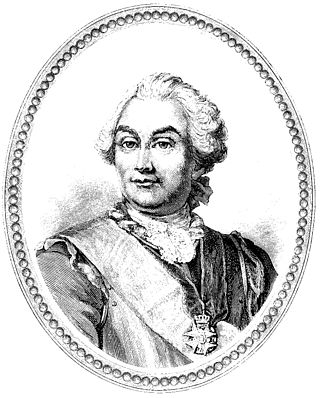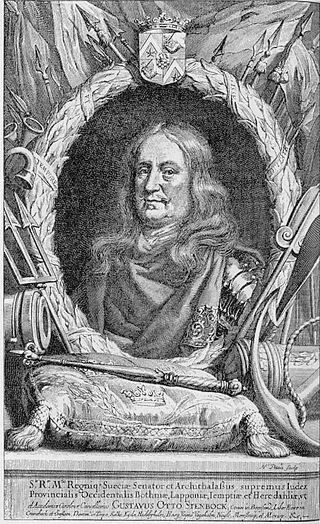External links
-
 Media related to Lord Marshals of the Riksdag of the Estates at Wikimedia Commons
Media related to Lord Marshals of the Riksdag of the Estates at Wikimedia Commons
Lantmarskalk, (English: Lord Marshal; German : Lantmarschall) was the title of one of the speakers of the Swedish Riksdag of the Estates, from 1627 to 1866 and of the Diet of Grand Duchy of Finland from 1809 to 1906. The Lantmarskalk was appointed by the Estate of the Nobles and also served as its speaker (talman). The Lantmarskalk should not be confused with the Riksmarsk (Lord High Constable of Sweden) or the Riksmarskalk (Marshal of the Realm), which were Great Officers of the Realm and royal appointees.
Between approximately 1720 and 1772 two parties Hats and Caps were active during a short period of parliamentary rule, referred to as the age of liberty.

The Council of the Realm, or simply The Council, was a cabinet of medieval origin, consisting of magnates which advised, and at times co-ruled with, the King of Sweden.

Count Fredrik Axel von Fersen was a Swedish statesman and soldier of Baltic German descent. He served as Lord Marshal of the Riksdag of the Estates, and although he worked closely with King Gustav III before and through the Revolution of 1772, he later opposed the king.

In Swedish and Finnish history, the Age of Liberty was a period that saw parliamentary governance, increasing civil rights, and the decline of the Swedish Empire that began with the adoption of the Instrument of Government in 1719 and ended with Gustav III's self-coup in 1772. This shift of power from the monarch to parliament was a direct effect of the Great Northern War.

Gustaf Otto Gustafsson Stenbock was a Swedish military officer and politician.

The Swedish nobility has historically been a legally and/or socially privileged class in Sweden, and part of the so-called frälse. The archaic term for nobility, frälse, also included the clergy, a classification defined by tax exemptions and representation in the diet. Today the nobility does not maintain its former legal privileges although family names, titles and coats of arms are still protected. The Swedish nobility consists of both "introduced" and "unintroduced" nobility, where the latter has not been formally "introduced" at the House of Nobility (Riddarhuset). The House of Nobility still maintains a fee for male members over the age of 18 for upkeep on pertinent buildings in Stockholm.

The Governor of a province of Finland headed the activities of the State Provincial Office until the end of 2009, when the provinces were abolished. The governors were appointed by the President. Many former ministers including but not limited to Kaarlo Hillilä, Martti Miettunen, Hannele Pokka and Anneli Taina served as governors, since the post was regarded as prestigious enough for a retiring minister, but still politically neutral. The title of maaherra was also considered a personal title, such that once appointed, the title maaherra remained for life.

The speaker of the Riksdag is the presiding officer of the national unicameral legislature in Sweden.

Ebba Magnusdotter Brahe was a Swedish countess, landowner, and courtier. She is foremost known for being the love object of King Gustavus Adolphus of Sweden, and because he wished to marry her prior to his marriage, plans which were however never realized. Their love affair has been famous in the Swedish romantic history and the subject of fiction, and are documented in their preserved correspondence.
The Hats were a Swedish political faction active during the Age of Liberty (1719–1772). Their name derives from the tricorne hat worn by officers and gentlemen. They vied for power with the opposing Caps party. In 18th century Swedish politics, the Hats represented conservatives, the Caps represented liberals. The Hats, who ruled Sweden from 1738 to 1765, advocated an alliance with France and an assertive foreign policy, especially towards Russia. During their tenure, they involved Sweden in two expensive and disastrous wars, in the 1740s and 1750s.

Louisa Ulrika of Prussia was Queen of Sweden from 1751 to 1771 as the wife of King Adolf Frederick. She was queen mother during the reign of King Gustav III.
The Lord High Constable was a prominent and influential office in Sweden, from the 13th century until 1676, excluding periods when the office was out of use. The office holder was a member of the Swedish Privy Council and, from 1630 and on, the head of the Swedish Council of War. From 1634, the Lord High Constable was one of five Great Officers of the Realm.

The Lord of the Realm was a title of honour introduced by Gustavus III, King of Sweden shortly after his coup and the newly passed constitution. The title was granted by the King and was first received by Frederick William, Prince von Hessenstein on 15 January 1773 by letter. One of the most famous title holders was Hans Axel, Count von Fersen, the supposed lover and confidant of Marie Antoinette, Queen of France.

Baron Fredrik von Essen was a Swedish politician, friherre, Marshal of the Realm and lord of Kavlås Castle.

Count Henning Ludvig Hugo Hamilton was a Swedish count, politician, government official and author. His father was Gustaf Wathier Hamilton. Today he is perhaps best remembered for the so-called Hamilton scandal.

Count Magnus Gabriel De la Gardie was a Swedish statesman and military man. He became a member of the Swedish Privy Council in 1647 and came to be the holder of three of the five offices counted as the Great Officers of the Realm, namely Lord High Treasurer, Lord High Chancellor and Lord High Steward. He also served as Governor-General in the Swedish dominion of Livonia.

The Wachtmeister family is a Swedish noble family from Livonia, who immigrated to Sweden in the 16th century. The name Wachtmeister is German for 'sergeant'.